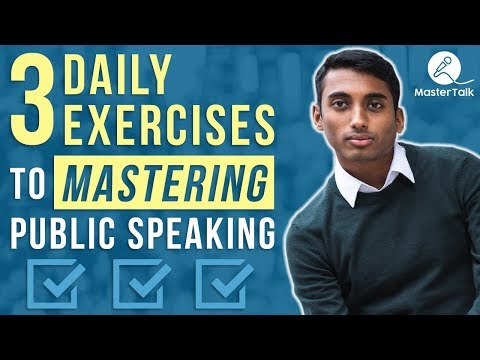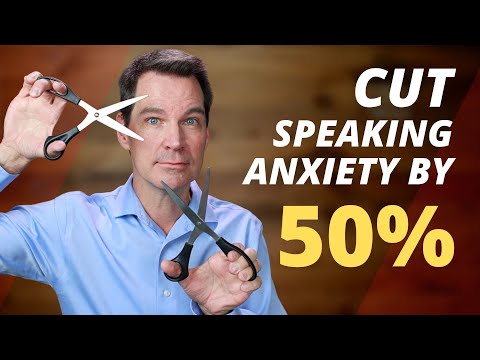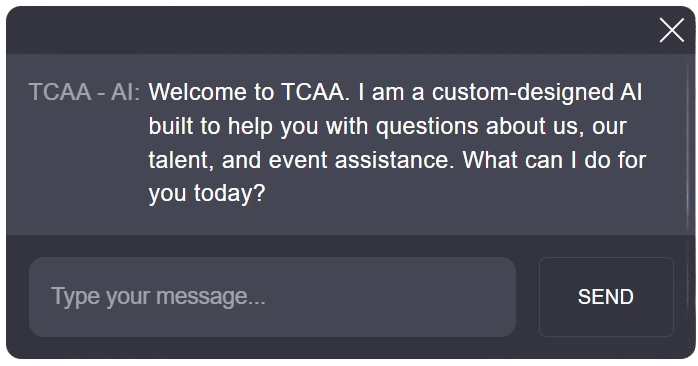Mastering public speaking is a thrilling venture that can significantly elevate both your personal and professional life. By practicing public speaking diligently, you can turn stage fright into a powerful performance tool. Whether you’re delivering a keynote speech, presenting at a business meeting, or simply honing your communication skills, the art of public speaking practice is crucial. So, let’s dive into some practical strategies to help you “master your stage fright.”

How to Practice Public Speaking Effectively
1. Rehearse with Purpose
Practicing with purpose is essential for becoming a formidable speaker. Iconic figures like Winston Churchill and TED Talk experts emphasize relentless practice. It’s not just about running through your speech; focus on intonation, pacing, and body language. Record yourself to spot areas for improvement or get a friend’s honest feedback. Practice public speaking as if it’s a live performance every time. If you need specific public speaking tips, this resource can be immensely helpful.
2. Simulate Real-Life Scenarios
Moving beyond practice, it’s crucial to replicate your speech environment. High-profile speakers like Bill Gates rehearse in the settings they’ll be presenting. Practicing in a similar space helps mitigate surprises. If you’re speaking at a corporate conference, use a similar meeting room for rehearsals. For larger stages, local community theaters can offer a stage feel. The key is to simulate your upcoming experience as closely as possible.

How to Speak Professionally Under Pressure
1. Embrace Visualization Techniques
Visualization is a powerful strategy used by many successful individuals. Michael Phelps, for example, visualized his races down to every last detail. Picture yourself delivering a smooth, compelling speech with the audience reacting positively. This mental prep can diminish anxiety and boost confidence. Use this technique to see your success before your actual performance.
2. Adopt the Power Pose
Amy Cuddy’s concept of the power pose involves adopting confident stances to influence your mental state. Stand tall, shoulders back, in a confident stance before taking the stage. Doing this for just a few minutes can significantly reduce stress hormones like cortisol, making you feel more self-assured and ready to tackle your speech professionally.

| Aspect | Details |
| Importance | Improves Communication Skills: Enhances clarity and effectiveness in conveying ideas. |
| Boosts Confidence: Reduces anxiety and boosts self-esteem. | |
| Professional Growth: Vital for career advancement and leadership roles. | |
| Tools & Techniques | Mirror Practice: Increases self-awareness and helps refine gestures and facial expressions. |
| Recording: Allows for self-evaluation and identifying areas for improvement. | |
| Feedback: Gaining constructive feedback from peers or mentors is crucial for growth. | |
| Mock Presentations: Simulates real scenarios and enhances preparedness. | |
| Visualization: Mental practice of the speech to build confidence and improve delivery. | |
| Public Speaking Platforms | Toastmasters: Offers structured programs and a supportive community. |
| Public Speaking Courses: Available online (e.g., Coursera, Udemy) and offline. | |
| Speech Coaches: Professional guidance tailored to individual needs. | |
| Benefits | Enhanced Persuasion: Ability to influence and convince others. |
| Networking Skills: Creates and strengthens professional and personal connections. | |
| Critical Thinking: Improves the ability to organize thoughts quickly and logically. | |
| Elevates Presence: Helps in establishing authority and credibility. | |
| Challenges | Stage Fright: Overcoming nervousness and anxiety. |
| Audience Engagement: Capturing and maintaining the audience’s attention. | |
| Content Organization: Structuring information in a coherent and compelling manner. | |
| Tips | Know Your Audience: Tailor content to their interests and level of understanding. |
| Practice Regularly: Consistent practice leads to continuous improvement. | |
| Use Visual Aids: Slides, props, and other tools to enhance understanding and retention. | |
| Breathe: Practice breathing techniques to maintain calm and control pace. | |
| Resources | Books: ‘Talk Like TED’ by Carmine Gallo, ‘The Art of Public Speaking’ by Dale Carnegie. |
| Websites: TED.com, Toastmasters.org. | |
| Apps: Public Speaking for Cardboard, Orai, Ummo. |
Proven Methods for Public Speaking Practice
1. Join a Public Speaking Group
Toastmasters International is an invaluable resource for anyone looking to practice public speaking. With structured meetings, you’ll get ample opportunities to speak and receive constructive feedback. Many notable leaders began their speaking careers in such groups. Here, participants learn from each other’s experiences, making every session a learning opportunity.
2. Engage in Improvisational Activities
Improvisational (improv) classes can transform your speaking abilities. Institutions like Second City Training Center and Groundlings offer classes that help you think quickly and handle unexpected questions or changes in your speech. Improv teaches flexibility, an invaluable skill on any stage.

Incorporate Technology into Your Practice Routine
1. Use Speech Coaching Apps
Apps like Orai and Yoodli provide immediate feedback on aspects such as filler words, clarity, and pacing. They’re excellent tools for consistent practice, helping you refine your delivery. Integrate these innovations into your routine to track progress and continually improve your public speaking skills.
2. Utilize Virtual Reality (VR)
Virtual reality platforms like VirtualSpeech offer immersive environments for simulating public speaking scenarios. This technology helps reduce stage fright by giving you a realistic experience before stepping onto an actual stage. It’s an innovative method to practice public speaking, blending theoretical practice with real-world application.

Cultivate Consistency and Confidence
1. Set a Regular Practice Schedule
Tony Robbins, a renowned motivational speaker, swears by the importance of daily practice. Integrate short speaking exercises into your daily life, like summarizing your day or delivering impromptu speeches. Cultivating a routine will gradually build your confidence and improve your public speaking skills. For comprehensive tips, check out these speaker notes examples here.
2. Seek Out Speaking Opportunities
Every speaking opportunity is a chance to build confidence. Volunteer for presentations at work, participate in webinars, or speak at community events. Iconic speakers like Simon Sinek and Brene Brown started small before gracing larger platforms. Each experience contributes to your overall growth.
Transforming Your Public Speaking Journey
Mastering public speaking is a journey paved with persistence, practice, and openness to new techniques. By integrating these strategies, you set a solid foundation for becoming a confident communicator. Conquering stage fright transforms from a lofty goal into an achievable reality with consistent effort.
Seeing your speaking engagements as opportunities to connect and inspire rather than hurdles significantly changes your approach. Embrace each chance to speak with enthusiasm, and watch your abilities soar. For insights on delivering successful virtual presentations, explore this guide.
Take the stage confidently, knowing you’ve prepared thoroughly. The audience awaits to be inspired by your words, and with practice, you’re on your way to making a lasting impact.
Practice Public Speaking: Master Your Stage Fright
It’s no secret that public speaking can be nerve-wracking for most folks. But did you know that practicing public speaking can transform even the most hesitant beginner into a compelling orator? Let’s dive into some fun trivia and fascinating facts about public speaking that might just surprise you!
Celebrity Inspiration
Public speaking isn’t just for politicians and motivational speakers—many celebrities had to overcome their stage fright too. Take Paul Orfaela, founder of Kinko’s, for instance. Despite having dyslexia and ADHD, he mastered the art of public speaking and became an inspirational figure for many entrepreneurs. Just goes to show that with practice, anyone can captivate an audience.
Surprising Insights
Another interesting tidbit is that the longest uninterrupted speech recorded was delivered by Pat Riley during his coaching career. It spanned over three hours! Now that’s some serious stamina. If you think public speaking is a marathon, you’re probably right. Consistent practice can build your confidence and endurance, much like what Riley achieved in his coaching career.
Everyday Comparisons
Believe it or not, the skills you develop while practicing public speaking can be quite beneficial in your day-to-day life. Speaking effectively is not a far cry from negotiating 30-year mortgages, where clarity and confidence are key. Plus, practicing your speech delivery can even help you articulate your thoughts better during a job interview, potentially boosting your buyer salary negotiations.
Overcoming Fear
Public speaking can feel as intimidating as walking through the rough streets of West Baltimore. But interestingly, the concept of facing one’s fears head-on is often the best route to overcoming them. This is much like the approach many people take to surmount difficulties related to dangerous Moms, showing that practice can truly make a difference in your mental resilience.
Fun Facts
Did you know that more people are afraid of public speaking than of death itself? This fact was underscored in a study by the National Institute of Mental Health. It’s ironic but true. Still, with practice, you can transform this fear into a powerful tool for communication. Even people with unique life challenges, such as those asking, What Is Daca status, find that public speaking helps them share their personal stories more compellingly.
There you have it—some interesting pennings and enjoyable trivia to help you on your way to mastering the art of public speaking. Keep practicing, and who knows? You might just steal the spotlight at your next presentation!



















